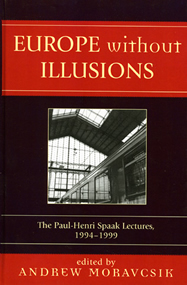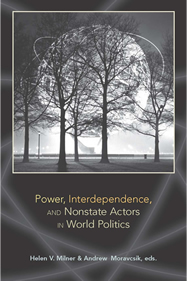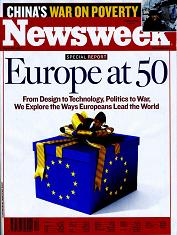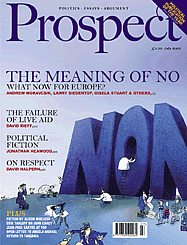|
RESEARCH
INTERESTS WITH SELECTED PUBLICATIONS
The
History and Theory of European Integration
Democracy
in the European Union and Other International
Organizations
The
Origins and Evolution of Global Human Rights
Norms
Human Rights, Sovereignty, and American Unilateralism
International
Law
Negotiation
Theory and Transnational Political Entrepreneurship
Theories
of International Relations: Liberalism, Realism,
Constructivism, Two-Level Games
Methodology and Historiography
International Power, Global Geopolitics, and European Foreign Policy
Commentary
and Reviews in Journals of Civic Opinion
Publications
on Music
THE
HISTORY AND THEORY OF EUROPEAN INTEGRATION
“Preferences, Power and Institutions,,” in Journal of Common Market Studies (Special Issue: Liberal Intergovernmentalism and its Critics) (11 September 2018).
“Liberal Intergovernmentalism,” in Antje Wiener, Tanja A. Börzel, and Thomas Risse, eds. European Integration Theory (Oxford: Oxford University Press, 2019). (with Frank Schimmelfennig)
 The
Choice for Europe: Social Purpose and State
Power from Messina to Maastricht (Ithaca,
NY: Cornell University Press, European edition
with London: Routledge/UCL Press, 1998.) The
Choice for Europe: Social Purpose and State
Power from Messina to Maastricht (Ithaca,
NY: Cornell University Press, European edition
with London: Routledge/UCL Press, 1998.)
Selected
Reviews:
A Recent Discussion of the Jacket Design.
Donald
Puchala, "Institutionalism,
Intergovernmentalism, and European Integration:
A Review Article," Journal
of Common Market Studies (June 1999).
William Hitchcock, "Review
of The Choice for Europe," American
Historical Review (December 1999)
Symposium
on The Choice for Europe (James
Caporaso, Fritz Scharpf, Helen Wallace)
in Journal of European Public Policy (March 1999)
Quotations
from More Reviews of The Choice for
Europe
Bibliography
of Reviews of The Choice for Europe
European
Integration and the Liberal Theory of World
Politics: Essays 1991-2001
(London: Routledge, under contract)
 Europe
without Illusions (Lanham, MD: University
Press of America, 2005). Europe
without Illusions (Lanham, MD: University
Press of America, 2005).
"Europe
without Illusions," in Moravcsik, ed., Europe without Illusions (above).
“Charles de Gaulle and Europe: The New Revisionism,” Journal of Cold War Studies 14:1 (Winter 2012).
“Liberal Intergovernmentalism,” in Antje Wiener and Thomas Diez, eds. European Integration Theory (Oxford: Oxford University Press, 2009). (with Frank Schimmelfennig).
"The
European Constitutional Settlement,"
in Kathleen McNamara and Sophie Meunier, eds. Making History: European Integration and
Institutional Change at 50 (State of the
European Union, Vol. 8) (NY: Oxford Univ Press,
2007).
Europe
in the New World Economy, International
Library of Writings on the New Global Economy
(Cheltenham, UK: Edward Elgar Publishers, under
contract)
"The
European Constitutional Compromise and the Neofunctionalist
Legacy," Journal of European Public
Policy 12:2 (April 2005), pp. 349-386.
"De
Gaulle between Grain and Grandeur: The Economic
Origins of French EC Policy, 1958-1970,"
Part I and
Part II,
Journal of Cold War Studies (Spring 2000 and
Fall 2000). "Symposium and Responses,"
Journal of Cold War Studies (Fall 2000). (Responses
by John Gillingham,
Stanley Hoffmann,
John Keeler,
Alan Milward,
Marc Trachtenberg,
and Jeffrey Vanke,
and rejoinder by Moravcsik).
"A
New Statecraft? Supranational Entrepreneurs
and International Cooperation" International
Organization (Spring 1999)
"Explaining
the Treaty of Amsterdam: Interests, Influences,
Institutions," Journal of Common
Market Studies (March 1999) (with Kalypso
Nicolaïdis).
"Is Something
Rotten in the State of Denmark? Constructivism
and European Integration," Journal
of European Public Policy ("Special
Issue: The Social Construction of Europe,"
6:4, 1999).
"Bringing
Constructivist Theories of the EU out of the
Clouds: Have they Landed Yet?" European
Union Politics (June 2001).
"National
Interest, State Power, and EU Enlargement,"
East European Politics and Society (February
2003) (with Milada Vachudova)
For
unabridged, fully footnoted working paper
version, click here.
"The
Political Economy of Financial Assistance to
Eastern Europe, 1989-1991" (with Stephan
Haggard) in Robert O. Keohane, Joseph S. Nye
and Stanley Hoffmann, eds., After
the Cold War: Politics and Institutions in Europe
(Cambridge: Harvard University Press, 1993).
"Preferences
and Power in the European Community: A Liberal
Intergovernmentalist Approach," Journal
of Common Market Studies (30th Anniversary
Edition) (December 1993).
"Negotiating the Single European Act: National Interests and Conventional Statecraft in the European Community," International Organization (Winter 1991).
DEMOCRACY IN THE EUROPEAN UNION AND OTHER INTERNATIONAL
ORGANIZATIONS
“Are Criticisms of the EU’s ‘Democratic Deficit’ Consistent with Basic Political Science?” Keynote Address to the 17th Annual Meeting of the Hungarian Political Science Association (20 May 2011).
"Democracy-Enhancing Multilateralism," International Organization (Winter 2009) (with Robert Keohane and Stephen Macedo).
“Constitutional Democracy and World Politics: A Response to Gartzke and Naoi,” International Organization (Summer 2011). (with Robert O. Keohane and Stephen Macedo)
"Democracy-enhancing
Multilateralism," Institute
for International Law and Justice Working Paper
(No. 2007/4, New York University Law School,
2007) (with Robert Keohane and Stephen Macedo).
"The Myth of Europe's 'Democratic Deficit'," Intereconomics: Journal of European Economic Policy (November-December 2008).
"The European Constitutional Settlement," World Economy (January 2008).
“Is
there a ‘Democratic Deficit’ in
World Politics?” (President’s Lecture
Series, Princeton University, 5 April 2007).
For a direct link to a high-speed
webcast, click here.
For various webcast options, click here.
“What
Can We Learn from the Collapse of the European
Constitutional Project? A Symposium",
Politische Vierteljahresschrift 47:2
(forthcoming 2006). Part of a forum with Fritz
Scharpf, Michael Zuern, Wolfgang Wessels, and
Andreas Maurer.
Responses
by Pepper
Culpepper and Archon Fung, James
Fishkin, Mark
Franklin, Paul
Magnette, Giandomenico
Majone, Jeremy
Rabkin and Loukas
Tsoukalis, and Moravcsik's "Response
to Eight Critics."
French Translation: "Que
faut-il retenir de l’effondrement du
Projet Constitutionnel Européen?"
"The
European Constitutional Compromise and the Neofunctionalist
Legacy," Journal of European Public
Policy 12:2 (April 2005), pp. 349-386.
"The
European Constitutional Compromise,"
EUSA Review 18: 2 (Spring 2005).
"Is
there a 'Democratic Deficit' in World Politics?
A Framework for Analysis," Government
and Opposition 39:2 (2004).
"In
Defence of the Democratic Deficit: Reassessing
Legitimacy in the European Union,"
Journal of Common Market Studies (40th
Anniversary Edition) 40:4 (November 2002).
For
a summary and review, see Julie Smith, "Global
Newsstand: The Heartless EU," Foreign
Policy (March 2003).
Andreas
Føllesdal and Simon Hix, “Why
there is a Democratic Deficit in the EU: a
Response to Majone and Moravcsik,”
(forthcoming, Journal of Common Market
Studies, June 2006).
 Moravcsik,
ed. Centralization
or Fragmentation? Europe Facing the Challenges
of Deepening, Diversity, and Democracy (New York: Council on Foreign Relations,
1998). Moravcsik,
ed. Centralization
or Fragmentation? Europe Facing the Challenges
of Deepening, Diversity, and Democracy (New York: Council on Foreign Relations,
1998).
"Europe's
Integration at Century's End," in
Moravcsik, ed. Centralization
or Fragmentation? Europe Facing the Challenges
of Deepening, Diversity, and Democracy (above).
"On
Democracy and 'Public Interest' in the European
Union," in Wolfgang Streeck and Renate
Mainz, eds., Die Reformierbarkeit der Demokratie.
Innovationen und Blockaden (Frankfurt: Campus
Verlag, 2002). (with Andrea Sangiovanni)
"Federalism
in the European Union: Rhetoric and Reality,"
in Kalypso Nicolaïdis and Robert Howse,
eds., The Federal Vision: Legitimacy and
Levels of Governance in the US and the EU
(Oxford: Oxford University Press, 2001).
"Conservative
Idealism and International Institutions,"
Chicago Journal of International Law
(Autumn 2000).
"Keynote
Article: Federal Ideals and Constitutional Realities
in the Treaty of Amsterdam" The
European Union 1997: Annual Review of Activities
(Special Issue of Journal of Common Market
Studies) (Oxford: Blackwell, 1998). (with
Kalypso Nicolaïdis)
"Why
the European Community Strengthens the State:
Domestic Politics and International Institutions,"
Center for European Studies Working Paper Series
52 (Cambridge: Center for European Studies,
1994).
"If
it Ain't Broke, Don't Fix It! Europe's Rhetoric
and America's Fears," Newsweek
(4 March 2002, Atlantic Edition).
THE
ORIGINS AND EVOLUTION OF GLOBAL HUMAN RIGHTS
NORMS
"The
Origins of International Human Rights Regimes:
Democratic Delegation in Postwar Europe"
International Organization (Spring 2000).
"Explaining
International Human Rights Regimes: Liberal
Theory and Western Europe," European
Journal of International Relations (Summer
1995).
HUMAN RIGHTS, SOVEREIGNTY, AND AMERICAN UNILATERALISM
"The
Paradox of US Human Rights Policy,"
in Michael Ignatieff, ed. American Exceptionalism
and Human Rights (Princeton: Princeton
University Press, 2005)
"Why
Is U.S. Human Rights Policy So Unilateralist?"
in Shepard Forman and Patrick Stewart, eds.,
The Cost of Acting Alone: Multilateralism
and US Foreign Policy (Boulder: Lynne Riener
Publishers, 2001).
"The
New Abolitionism: Why Does the US Practice the
Death Penalty while Europe Does Not?",
European Studies (September 2001).
Response:
"The
New Abolitionism: American or European Exceptionalism
regarding the Death Penalty?" (Stephen
J. Silvia and Aaron Beers Sampson)
Rejoinder:
"The
Death Penalty: Getting Beyond 'Exceptionalism'"
"Conservative
Idealism and International Institutions,"
Chicago Journal of International Law
(Autumn 2000).
INTERNATIONAL LAW
“Liberal Theories of International Law,” in Jeffrey L. Dunoff and Mark A. Pollack, eds., Interdisciplinary Perspectives on International Law and International Relations: The State of the Art (2012).
"Legalized
Dispute Resolution: Interstate and Transnational,"
International Organization (Summer 2000).
(with Robert Keohane and Anne-Marie Slaughter)
"The
Concept of Legalization" International
Organization (Summer 2000). (with Kenneth
Abbott, Robert Keohane, Anne-Marie Slaughter,
and Duncan Snidal)
NEGOTIATION THEORY AND TRANSNATIONAL POLITICAL
ENTREPRENEURSHIP
"A
New Statecraft? Supranational Entrepreneurs
and International Cooperation" International
Organization (Spring 1999).
"Integrating International and Domestic
Theories of International Bargaining" (Chapter
One) in Peter Evans, Harold Jacobson and Robert
Putnam, eds., Double-Edged
Diplomacy: Interactive Games in International
Affairs (Berkeley: University of California
Press, 1993).
"Armaments among Allies: Franco-German Weapons Cooperation, 1975-1985" (Chapter Eight) in Evans, Jacobson and Putnam, eds. Double-Edged Diplomacy (see above).
THEORIES OF INTERNATIONAL RELATIONS:
LIBERALISM, REALISM, CONSTRUCTIVISM, TWO-LEVEL
GAMES, POST-MODERNISM
 Helen Milner and Andrew Moravcsik, eds. Power, Interdependence and Non-State Actors in World Politics: Research Frontiers (Princeton: Princeton University Press, 2009). Helen Milner and Andrew Moravcsik, eds. Power, Interdependence and Non-State Actors in World Politics: Research Frontiers (Princeton: Princeton University Press, 2009).
“Robert Keohane: Political Theorist,” in Helen Milner and Andrew Moravcsik, eds. Power, Interdependence and Non-State Actors in World Politics: Research Frontiers (Princeton: Princeton University Press, forthcoming 2009).
"The New Liberalism," in Christian Reus-Smit and Duncan Snidal, eds. The Oxford Handbook of International Relations (2008).
"Theory
Synthesis in International Relations: Real Not
Metaphysical," International Studies
Review (March 2003)
"Taking
Preferences Seriously: A Liberal Theory of International
Politics" International Organization
(Autumn 1997).
"Liberal
International Relations Theory: A Scientific
Assessment" in Colin Elman and Miriam
Fendius Elman, eds. Progress in International
Relations Theory: Appraising the Field (Cambridge,
Mass.: MIT Press, 2003), 159-204.
"‘Wahn,Wahn, Überall Wahn’: A Reply to Jahn’s critique of liberal internationalism,” International Theory 2:1 (2010).
"Tilting at Windmills: A Final Reply to Jahn," International Theory 2:1 (2010).
"Is
Anybody Still a Realist?" International
Security (Fall 1999) (with Jeffrey Legro).
"Is
Anybody Still a Realist? The Authors Reply,"
in "Correspondence: Brother, Can You Spare
a Paradigm? (Or Was Anybody Ever a Realist?),"
International Security (Summer 2000).
(Reply to critiques
by Peter Feaver, Gunther Hellmann, Randall Schweller,
Jeffrey Taliaferro and William Wohlforth)
"Is Something
Rotten in the State of Denmark? Constructivism
and European Integration" Journal
of European Public Policy ("Special
Issue: The Social Construction of Europe,"
2000).
"The
Future of European Integration Studies: Social
Theory or Social Science?" Millennium
(Autumn 1999).
"Bringing
Constructivist Theories of the EU out of the
Clouds: Have they Landed Yet?" European
Union Politics (June 2001).
"Federalism
and Peace: A Structural Liberal Perspective"
Zeitschrift für internationale Beziehungen
(Spring 1996).
"Integrating International and Domestic
Theories of International Bargaining" (Chapter
One) in Peter Evans, Harold Jacobson and Robert
Putnam, eds., Double-Edged
Diplomacy: Interactive Games in International
Affairs (Berkeley: University of California
Press, 1993).
METHODOLOGY AND HISTORIOGRAPHY
"Graduate Qualitative Methods Training
in Political Science: A Disciplinary Crisis," American Political Science Association (April 2020).
"Active Citation and Qualitative Political Science," Qualitative & Multi-Method Research 10:1 (Spring 2012).
“Charles de Gaulle and Europe: The New Revisionism,” Journal of Cold War Studies 14:1 (Winter 2012).
"Active Citation: A Precondition for Replicable Qualitative Research," PS: Political Science and Politics 43(1) (January 2010).
INTERNATIONAL POWER, GLOBAL GEOPOLITICS, AND EUROPEAN FOREIGN POLICY
“Liberal Intergovernmentalism and EU External Action,” in Sieglinde Gstöhl and Simon Schunz, eds. The External Action of the European Union: Concepts, Approaches, Theories (London: Macmillian International, 2021).
“Europe: Quietly Rising Superpower in a Bipolar World,” in Alan Alexandroff and Andrew Cooper, eds., Rising States, Rising Institutions (Washington: Brookings Institution Press, 2010). "Europe: The Second Superpower," Current History (March 2010).
"Europe: The Quiet Superpower," French Politics 7:3/4 (September-December 2009).
COMMENTARY AND REVIEWS IN JOURNALS OF CIVIC
OPINION
 "The Quiet Superpower," Global Europe (14 September 2009). "The Quiet Superpower," Global Europe (14 September 2009).
"Europe Defies the Skeptics: How Crisis Will Make the EU Stronger," Newsweek (1 August 2009).
"Don't Know? Vote No!" Prospect (July 2008, London).
"Washington Cries Wolf," Newsweek (International edition, 31 March 2008, Cover Story).
"The Self-Absorbed Dragon," Newsweek (International edition, 29 October 2007).
"Soft Power's Libyan Triumph," Financial Times (30 July 2007, Opinion and Comment).
"A
Rogue Reforms: Libya Comes in from the Cold," Newsweek (International
editions, 16 July 2007).
"The
Golden Moment: The EU at 50," Newsweek (Cover Story, International
edition, 26 March 2007).
(For a .pdf copy of the illustrated print edition,
click here.)
"Failing
to Learn their Lessons: Rhetoric and Reality
in the European Union," Financial
Times (Special Section on the Future of
Europe, 27 January 2006).
Response:
Kirsty Hughes, "The
Debate about Europe's Future has Got to Make
the Issue of Democracy Striking and Understandable,"
Financial Times (31 January 2006).
"Brussels
Diary: An End to Constitutional Confusion,"
Prospect (October 2005, 10th Anniversary
Special Issue).
"Europe
without Illusions," Prospect
(July 2005) (cover article with commentary by
Larry Siedentop, Gisela Stuart, John Kay, Sunder
Katwala, Charles Grant, Michael Maclay, Philippe
Legrain).
"A
Too Perfect Union? Why Europe Said 'No,'"
Current History (November 2005).
"Europe
Works Well Without the Grand Illusions,"
Financial Times (13 June 2005).
"Europe
is the New Role Model for World," Financial
Times (5 October 2004).
"The
Unsung Constitution," Prospect
(March 2004).
"One
Year On: Lessons from Iraq," in Gustav
Lindstrom and Burkard Schmitt, eds., One
Year On: Lessons from Iraq (Chaillot Paper
No. 68) (Paris: European Union Institute for
Security Studies, March 2004).
"The
Death of Tory England," Newsweek
(10 November 2003, Atlantic edition).
"Debate:
Should the European Union be Able to Do Everything
that NATO Can?" NATO Review
(Autumn 2003) (with Fraser Cameron).
"Striking
a New Transatlantic Bargain," Foreign
Affairs (July/August 2003).
"A
Tory Referendum," Prospect
(July 2003).
"The
World is Bipolar After All," Newsweek
(5 May 2003, Atlantic Edition).
"How
Europe Can Win without an Army," Financial
Times (3 April 2003).
"The
EU Ain't Broke," Prospect (March
2003).
"The
Quiet Superpower," Newsweek
(17 June 2002, Atlantic Edition).
"The
Human Rights Blame Game," Newsweek
(22 April 2002, Atlantic Edition).
"If
it Ain't Broke, Don't Fix It! Europe's Rhetoric
and America's Fears," Newsweek
(4 March 2002, Atlantic Edition).
"Despotism
in Brussels? Misreading the European Union,"
Foreign Affairs (May/June 2001).
"Faux
Realism: Spin vs. Substance in the New Bush
Foreign Policy Doctrine," Foreign
Policy (July-August 2001). (with Jeffrey
Legro)
PUBLICATIONS ON MUSIC
"Everyday Totalitarianism: Reflections on the Stuttgart Ring," The Opera Quarterly (Winter 2010).
"Hidden
Arias," Newsweek (1 June 2004,
Atlantic edition).
"In
Defense of Bayreuth," German Politics
and Society (forthcoming)
"Moon
over Mozart: Peter Sellars at Glyndebourne,"
Newsweek (11 August 2003, Atlantic
edition).
"All
Wagner, All the Time," Newsweek
(26 August 2002, Atlantic Edition)
If you are unable to access
an electronic version of any selection,
please contact <amoravcs@princeton.edu>
to obtain a hard copy. Please
send any questions, suggestions, or complaints
concerning the coding or maintenance of this
website to Helene E. Wood at hwood@princeton.edu. |

 Europe
without Illusions
Europe
without Illusions Moravcsik,
ed.
Moravcsik,
ed. 
 "
"
